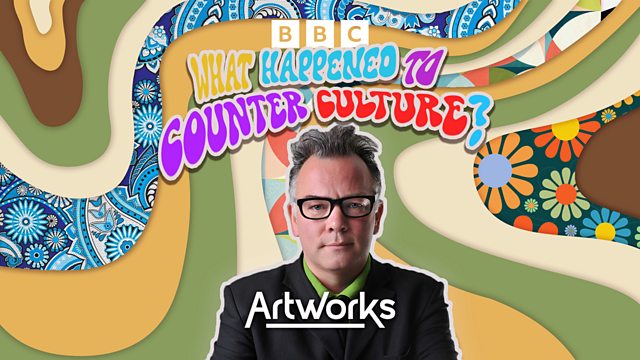1. Absolute Beginners
Comedian and author Stewart Lee explores the story and ideas of counter-culture since the end of the Second World War, and its uncertain status in today's digital world.
More than just a cultural trend – counter-culture became a social movement so powerful it shaped institutions, businesses, politics and the attitudes and aspirations of whole generations – including everything from haircuts to voting choices. In fact, it became so prevalent that it’s sometimes hard to remember how things have changed under its influence.
Comedian Stewart Lee presents a five-part series exploring the evolution and key ideas that have driven counter-culture from its beginnings with the Beats, folk and jazz in the 1950s, to its heights in the 1960s and 70s including the hippies and the early tech-communalists, the new liberation movements and punk, to the 1980s and early 90s, where political power on both sides of the Atlantic pushed back against the values of the ‘permissive society’.
Talking to artists, musicians, writers, activists and historians, Stewart continues to the present day asking where we are now, in the digital age of social media silos and the so-called ‘culture wars’ – what’s happened to counter-culture? Was it co-opted, did it sell out? Or did its ideas of freedom and identity become so entrenched within mainstream culture it’s legacy has become unassailable? Or has it migrated politically to the Right? Throughout the series, the counter-culture is explored not only in terms of its history, extraordinary cultural output and key events – but also its deeper political and philosophical impact, its continued meaning for our own age.
Part 1, Absolute Beginners, explores why the counter-culture happened when it did and the uniquely placed generation driving it forwards - the Beat poets, the folk scene and its ties to the growing peace movement. A younger generation rejected ideas of security and hyper-conformity – a fear of the automated society and of a repressed ‘One Dimensional Man’ - the life being lived by their parents, still shaken by World War Two. Freedom and self-expression would become the new currency and poet Alan Ginsberg’s Howl (1956) heralds the start of an unstoppable movement.
Contributors include musician Brian Eno, authors Iain Sinclair and Olivia Laing, music producer Joe Boyd, sculptor Emily Young, cultural historian Jon Savage and folk singer Shirley Collins, with Ian Kearey playing The Instrument.
Presenter: Stewart Lee
Producer: Simon Hollis
A Brook Lapping production for ÃÛÑ¿´«Ã½ Radio 4
Last on
More episodes
Previous
You are at the first episode
Broadcasts
- Thu 7 Aug 2025 09:00ÃÛÑ¿´«Ã½ Radio 4
- Sun 10 Aug 2025 23:00ÃÛÑ¿´«Ã½ Radio 4

